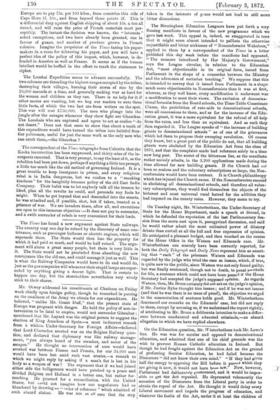The Birmingham Education Leaguers have put forth a very flaming
manifesto in favour of the new programme which we gave last week. This appeal is, indeed, so exaggerated in tone that it might seem almost intended to palliate the otherwise unjustifiable and bitter nickname of " Noneonformist Wahabees," applied to them by a correspondent of the Times in a letter published this day week before the manifesto had appeared. "The measure introduced by Her Majesty's Government," says the League circular, in relation to the Education Act, "most objectionable in its original form, issued from Parliament in the shape of a concordat between the Ministry and the advocates of sectarian teaching." We suppose that this is intended to convey that it issued from Parliament in a shape much more objectionable to Nonconformists than it was at first, whereas, as they well know, every modification it underwent was a modification to meet their views. The exclusion of denomina- tional formulas from the Board schools, the Time-Table Conscience Clause, the prohibition of rate-aids to denominational schools, were all concessions to them, and as for the increase of the Edu- cation grant, it was a mere equivalent for the refusal of all help from the rates, and less than an equivalent. And as such they then regarded it. The League speaks( of "the increase of building grants to denominational schools" as of one of the grievances which led them to propose their sweeping revolution. Of course they know, but a great part of the public do not, that all building grants were abolished by the Education Act from the close of 1870, and that the complaint made had reference solely to a time now long past. The secret of the bitterness lies, as the manifesto rather naively admits, in the 3,200 applications made during the time allowed for new building grants. If the Church had not been so zealous and the voluntary subscriptions so large, the Non- conformists would have been content. It is Church philanthropy which has injured the Church cause. If the Nonconformists succeed in abolishing all denominational schools, and therefore all volun- tary subscriptions, they would find themselves the objects of the bitterest and most universal rural hatred for the addition they had imposed on the county rates. However, they mean to try.






































 Previous page
Previous page